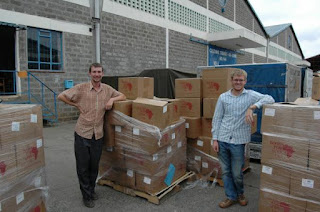When people tell me this I instinctively become defensive, since despite my lack of communication I have been neither quiet nor lost. As proof of this, or rather because I want to share some of this with folks in America, I have included a number of photos from this period.

At the beginning of the month my mother visited me for two weeks. Not only did she meet my friends, including Mary, Mr. Dick, and Mr. Hyena (shown in the above picture), but we also went to Masai Mara where she got to fulfill her high school dream of seeing exotic animals (such as the Cheetah shown below).

After she left I climbed Mt. Kenya, the second tallest mountain in Africa, with a small band of Peace Corps Volunteers. In the picture we are standing on the third tallest peak.

From Mt. Kenya I went to visit Eckhart at his site deep in the heart of Masai land - relatively uninhabited desert outside of Magadi. When we swore in as Peace Corps Volunteers and were given a map of Kenya I noted that there was a hot springs indicated on the map and set out to one day visit it. On the last day with Eckhart we set out at 5am to be at the hot springs in the early morning.

This hot springs is the most undeveloped I have ever seen. All of the pools are completely natural and the only sign of human use is garbage cans that have been strategically placed around the periphery.

Lake Magadi is home to the Magadi Soda Company, which mines and processes soda ash, a mineral compound used in the production of glass.

The lake was also used in the movie The Constant Gardener in the last scene where the diplomat, Mr. Doyle, goes to meet certain death. I believe that the picture below is where the scene was shot.

From Eckhart's site I visited my house for two days before heading off to Nairobi to meet a shipment of books, the arrival of which Matt Palma and I have been facilitating. See the bottom for a short tirade on the how this seemingly routine process went.

I had the pleasure of traveling with the truck of books to Matt's school while Matt remained in behind to tie up some loose ends. His students were very excited and equally cute.

The next day my school's portion of the books made it to school. Four schools participated and each one received approximately 5000 books. The board of governors at my school has been very helpful and is currently making arrangements to build shelves in our newly constructed library building. They want to call it the "Thomas Mosier School Library," a name that I am opposed to. Maybe we can call it the "Watu wa Amani School Library," which means "people of peace."

About facilitating the clearance of our container of books:
From personal research I knew that the importation of books in Kenya is NOT subject to the duty tax, and that this fee is automatically waived. They are subject to a CIF tax, which can be waived for books being donated to non-profit groups.
Matt and I set out to get the CIF waived. First, we compiled six documents ranging from a packing list for the container to a letter from the District Education Office and forwarded them to the Ministry of Education in Nairobi. The people there assured us that they would write the necessary two paragraph letter and forward it to the Ministry of Finance within 2 days. A week after the first meeting we called to inquire and found that they had not completed this task. Five more visits, numerous phone calls and one month later, they did forward the letter to the Ministry of Finance.
When Matt asked them which office they had forwarded the letter to in the Ministry of Finance they refused to tell him, saying that he would be notified when they had finished processing the exemption. Knowing that we did not have a chance of getting the exemption without our constant probing, Matt investigated and found the person in the Ministry of Finance responsible for handling this type of claim. This man assured us that all that needed to be done was for the Minister of Finance to sign our request and to forward the exemption code to the Kenya Revenue Authority.
One month and six visits by a plethora of volunteers, our books arrived in the Mombasa port without the Ministry of Finance fulfilling their promise. Having five days before the shipment was processed, we asked the shipping company, Siginon, to provide us with paperwork stating the amount required if we were unable to get the exemption. Siginon was very slow in providing this paperwork, but at our continued insistence gave us a paper on KRA letterhead stating that we did have to pay duty, which with the CIF totaled to 120,000KSH (about $1,500). Being very sure that duty was automatically waived, we took this presumably KRA issued paperwork to the KRA office, where we were informed that this paper was a forgery. The officer then showed us the real document, readily available in the KRA's online database, which showed that we only owed 20,000KSH (about $250).
They then called Siginon and threatened to press charges forgery charges. The company then called us, upset that we would go to KRA. Obviously we were the ones with a valid complaint since they forged a government document, presumably in an attempt to steal over $1,000 from us.
When I inquired again with the Ministry of Finance to hear how the tax exemption was coming, the officer who we had been dealing with told me that he had forwarded the letter to his supervisor and he no longer had any ability to work on the case. When I asked for the office number of his supervisor he said that I would not be able to find the person with the document because it had to pass through the hands of around seven other officers in the ministry.
With one day left, Matt went back to the officer who had the day before told me he could no longer assist us with the case, and was told by him that the next morning the Minister of Finance would sign the document. Matt called to tell Siginon this, but they informed him that they had already paid the 20,000KSH on our behalf. This was a good decision on their part because the officer in the Ministry of Finance stopped returning our calls and did not forward the exemption code to KRA.
This experience of dealing with the Kenyan government ministries was by far the most ridiculous and frustrating experience that I have had while in Kenya. It is almost comical how good they are at giving people that are trying to help Kenyan students the run around.